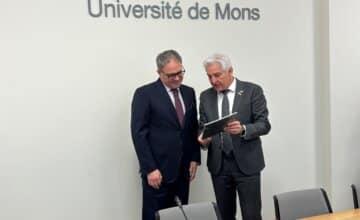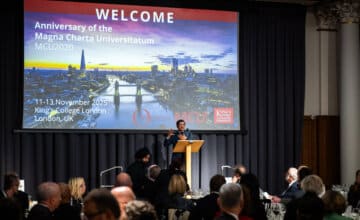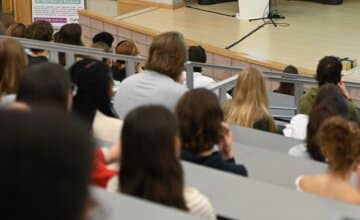The Faculty of Architecture and Urban Planning (FAU) and the Centre for Modern Languages (CLV) of the University of Mons (UMONS) have seized the opportunity to develop online collaboration projects designed to internationalise teaching. This is another way to give students the opportunity to benefit from an international experience while staying “at home”.
The first is an online exchange with Japan as part of the third-year Bachelor’s English course, run by Lisa Demaret (CLV). In collaboration with Sandra Healy and Yasushi Tsubota, who are both English language teachers at the Kyoto Institute of Technology (KIT), and Julie Walaszczyk (CLV), responsible for writing and designing the modules, Lisa Demaret has managed to incorporate activities into her course which contribute to the development of intercultural skills and an exchange of ideas on themes specific to each of the participants’ disciplines. Twelve third-year UMONS Bachelor students and 15 first-year KIT Bachelor students volunteered to participate in this first edition. The students were put into pairs or small groups so as to facilitate discussions. As the exchange unfolded, online modules featuring different resources and tasks, to be completed in groups or in pairs, were made available to them. At the end of the modules, a poster was assessed by the subject teachers: Chaïma Seddiki (FAU, UMONS) and Takuya Miyake (Department of Architecture and Design, KIT). The project ended with an online party, during which the students had the opportunity to get to know the rest of the group through fun activities.
The second initiative, also for third-year Bachelor students, took place during “Creative Week”, from 9th to 13th November 2020, and was coordinated by Chaïma Seddiki (FAU) and Julie Walaszczyk (CLV). The CARE LAB (Creating Adequate Residence for the Elderly – Learning Across Borders) was established following discussions on the (re)design of the domestic and residential spaces of senior citizens, with the aim of ensuring greater autonomy and well-being. This is a relevant issue at the heart of current events, which the FAU students have been working on, together with lighting design students from the ITMO University in St. Petersburg. Architecture and engineering students from UPC (Barcelona, Spain) and KULeuven (Belgium) also volunteered to participate in this interdisciplinary exchange. Guest experts were invited to contribute to the reflections of the different groups: Fany Cérèse, a researcher and specialist in the subject in question, kicked off the debate with a videoconference on Architecture, Health and the Sense of Home for the Elderly, while Kevin Charras, PhD in environmental psychology, addressed the impact of the environment on people with dementia (Institutional Settings for People with Dementia). Chaïma Seddiki (UMONS), Miguel Usandizaga (UPC) and Daria Chirimisina (ITMO) assisted, supervised and guided the participants throughout the workshop.
- English as a lingua franca (ELF)
At present, English is predominantly used by non-native speakers around the world. In the context of their studies and/or work, students and future graduates are, and will be, more likely to be in contact with peers, colleagues and teachers for whom English is not their mother tongue or second language, and who use it primarily as a communication tool. However, foreign language learning, and more particularly the assessment of grammatical and lexical accuracy, is still often dictated by so-called “native” standards (mainly American English and British English). Statements such as “I don’t have a good accent” or “I speak badly” indicate a certain discomfort with one’s own mother tongue that “tarnishes” an unrealistic standard (“gatekeeping”, Jenkins, 2007). The advantage of using English as a common language is that it unlocks certain attitudes and allows language to be seen not as an end in itself, but as a tool for negotiating meaning.
- Inclusive and accessible internationalisation for everyone
Despite the democratisation of the Erasmus programme since its launch in 1987, a stay abroad entails a considerable financial cost which is not always fully consistent with the student’s socio-economic situation or covered by a grant. There may also be family or personal constraints which do not allow for mobility for longer or shorter periods. COIL (Collaborative Online International Learning) exchanges or online mobility (joint degree programmes with partner institutions) have so far remained minor experiments within programmes (often set up for language learning). The current health crisis has fundamentally challenged and changed our attitudes to travel. These online exchanges can supplement a “real” Erasmus, or even offer a more sustainable alternative, while giving all students the opportunity to develop intercultural skills, regardless of their academic background and language level.
- Supporting interdisciplinary collaboration and transversal skills
Participating in a digital exchange means learning to be resilient, leaving one’s comfort zone and confronting other points of view, challenging one’s own prejudices and maintaining a critical distance from one’s own culture, showing kindness, sharing knowledge and being exposed to sometimes very different and equally legitimate approaches to the same societal problem, and learning to be a more independent learner by collaborating with others and being actively involved. These are all skills that will enable future graduates to work responsibly in increasingly diverse contexts. Remote collaboration can be a way to internationalise programmes, in line with the UN’s Sustainable Development Goals, and particularly Goal 4 (to ensure inclusive and equitable quality education and promote lifelong learning opportunities for all), by integrating components such as interculturality, multilingualism and inclusion.
UMONS students’ testimonials:
Chloé: “I really enjoyed participating in this virtual exchange with Japan. It was very useful for me to share my views on architecture with Kosei and to discover how he worked in his school. The tasks were also very interesting, and some Japanese concepts helped me carry out my project. Communicating in Japanese was easier than I expected, despite the difference in our accents. I also think that it is important in our training to be able to express ourselves in English and to work with foreigners. I also really liked the games organised during the final Zoom session which allowed me to meet other Japanese students. Although the programme for the first semester of the third year of the Bachelor’s degree in Architecture was quite intense, I was delighted to have taken part in this exchange !”
Paul: “For this exchange, I had the chance to have two Japanese partners. What I preferred was the video calls with my partners, we could discuss the work, but about our culture too, language and share experiences. It’s a little complicated for the organization because there are many hours’ time difference but with a little bit of organization, we can make the work right in time. I learned to improve my organization, to work with others, and on my own culture too, and with the tasks I discovered many things. And, in time of Covid, this exchange is very interesting, it allows to travel and learn without moving, I really enjoyed this experience.”
Maxime: “In my opinion, the word that emerges from these exchanges is sharing. Coming from different backgrounds, it is beneficial for us students to discuss various topics with one another. This allows us to confront our differences and come up with solutions. Both experiences were very rewarding. The exchange with Japan was an opportunity given to us by our English teacher. It was not compulsory. At first, I was worried that I wouldn’t be able to take on the task, but in reality, the deadlines were perfect and everything was well supervised. We were asked to work in pairs to think about what kind of comfort we might experience through architecture. I was paired with a student who was quite open to discussion. I learnt a lot about her way of life and about life in Japan in general. We also did some quite interesting activities. As for the exchange with the Russian students, this exchange was carried out in groups. We had to think about an inclusive and multi-generational approach. This exchange, unlike the Japanese one, was compulsory and did not come at the right time. We worked on a more concrete project, which meant that we had to think about the subject in a different way. I am grateful to have had the opportunity to carry out these exchanges, from which I emerge with very positive feelings.”
Many thanks and congratulations to all the students of the Faculty of Architecture and Urban Planning (UMONS) who participated in the two exchanges, and special thanks to Chloé, Paul and Maxime who took time to talk about their experience.
Interview with Haruka, Kohsei and Salam (KIT, Japan) on their experience of the exchange:
Interview with Lisa Demaret (UMONS), Sandra Healy (KIT) and Yasushi Tsubota (KIT) who team-taught the virtual exchange as part of their language classes:
Interview with Chaïma Seddiki (UMONS) and Miguel Uzandisaga (UPC) who both contributed to CARE LAB:

References and Additional Resources
2020: the year of European virtual mobility?
7 tips for implementing virtual mobility
An international curriculum fit for Generation Greta
COIL – Virtual mobility without commercialisation
L’enseignement supérieur en marche vers 2030
Virtual exchange and Internationalisation at Home: the perfect pairing
Fany Cérèse’s blog: https://www.unmondeapart.org/
ITMO web page on the CARE LAB project: https://news.itmo.ru/en/blog/211/




